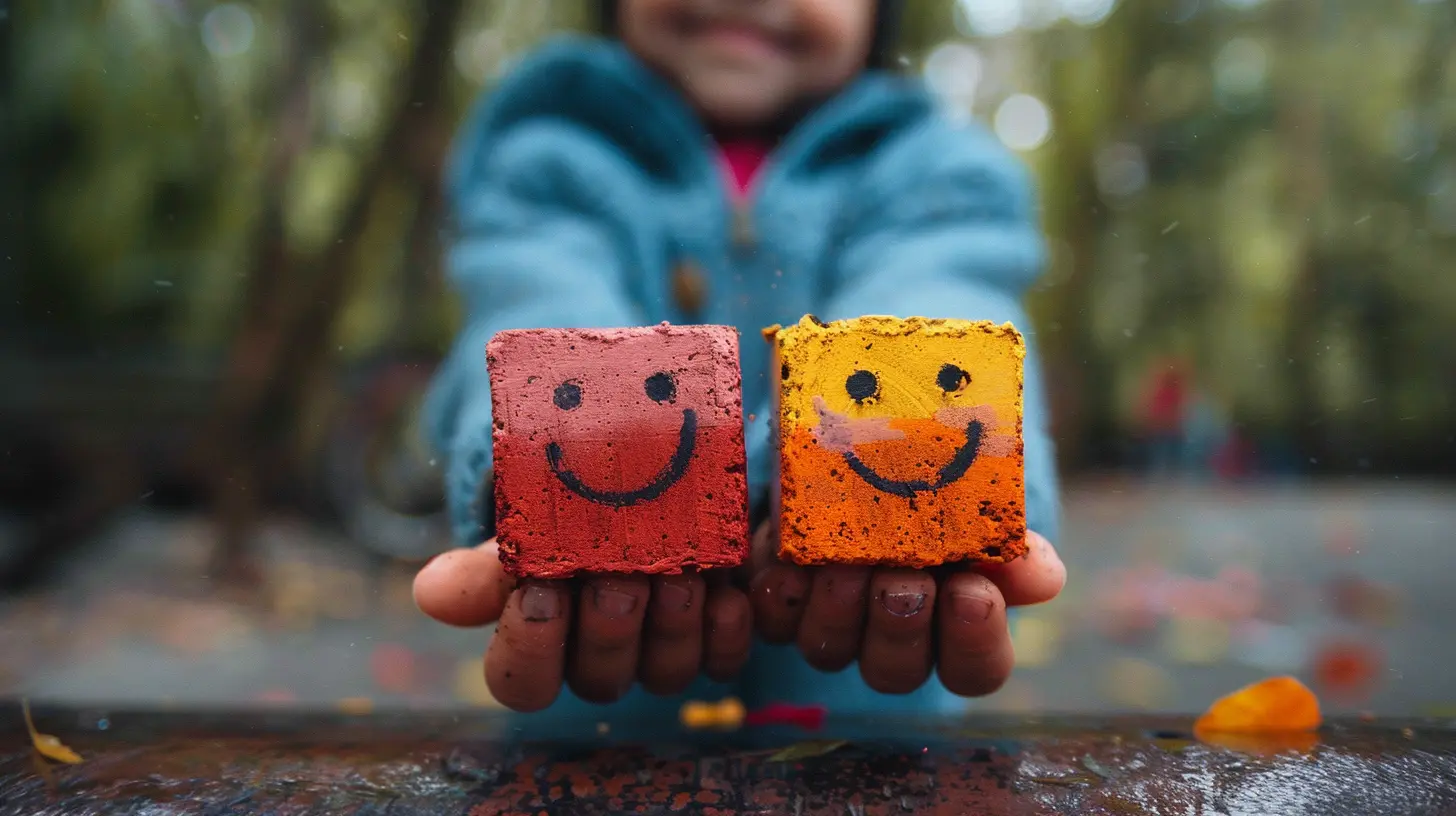Emotional Regulation for Better Relationships
2 April 2025
Have you ever found yourself in the middle of an argument with someone you care about, and suddenly your emotions take the wheel, driving the conversation into a ditch? Yeah, we've all been there. But what if I told you that learning how to regulate your emotions could help you steer your relationships in a healthier, more positive direction? Emotional regulation is the unsung hero in building and maintaining strong relationships, whether it's with your partner, friends, family, or even coworkers.
In this article, we’ll dive deep into what emotional regulation is, why it’s essential for better relationships, and how you can start practicing it today. Don't worry, we’ll keep it simple and actionable!

What Is Emotional Regulation?
Let’s start with the basics. Emotional regulation is the ability to manage and respond to your emotions in a way that is appropriate for the situation. It’s not about suppressing or ignoring your feelings; instead, it’s about being aware of them and knowing when and how to express them.Think of your emotions as the driver of a car. If you let them go unchecked, they could speed through red lights or take you in the wrong direction. Emotional regulation is like having a GPS system that helps you navigate those tricky emotional roads. It allows you to manage your emotional reactions so that they don’t control your behavior or, worse, harm your relationships.
Why Is Emotional Regulation Important in Relationships?
Now, you might be wondering, "Why should I care about emotional regulation in my relationships?" Well, let me ask you this—how many times have you said something in the heat of the moment, only to regret it later? Emotional regulation helps you avoid those pitfalls.Here’s why it’s crucial:
1. Reduces Conflict: When you can regulate your emotions, you're less likely to lash out or say things that escalate a situation. Instead of reacting impulsively, you can respond thoughtfully, which ultimately reduces unnecessary conflicts.
2. Promotes Empathy: Emotional regulation allows you to step back from your own feelings and consider how the other person might be feeling. This fosters empathy and understanding, which are key ingredients in any healthy relationship.
3. Builds Trust: When you consistently manage your emotions well, others will feel more comfortable and safe around you. They’ll trust that you won’t fly off the handle or withdraw emotionally, creating a more stable and secure relationship.
4. Improves Communication: Emotional regulation helps you communicate more effectively. You’re able to express your feelings clearly and calmly, without letting anger, frustration, or anxiety cloud your message.
5. Strengthens Bonds: When both partners in a relationship practice emotional regulation, it leads to fewer arguments, more constructive conversations, and deeper emotional connections.

The Science of Emotional Regulation
If emotional regulation sounds a little woo-woo to you, don't worry—it's backed by science! Our brains have two systems that play a significant role in how we handle emotions: the limbic system and the prefrontal cortex.- The limbic system is where our emotions are generated. When something triggers us, this part of the brain kicks into high gear, often causing us to react impulsively.
- The prefrontal cortex, on the other hand, is responsible for thinking, planning, and self-control. It’s the part of the brain that helps us pump the brakes and think before acting.
Emotional regulation happens when the prefrontal cortex steps in to manage the emotional responses generated by the limbic system. It’s kind of like having a wise older sibling who tells you, “Hey, maybe don’t throw that vase just because you’re mad.”
Interestingly, emotional regulation is like a muscle—the more you use it, the stronger it gets. Practicing emotional regulation regularly can literally rewire your brain, making it easier to manage your emotions over time.

Common Emotional Triggers in Relationships
Before we get into how to regulate your emotions, it’s helpful to know what typically triggers emotional responses in relationships. Once you identify these triggers, it becomes easier to manage your reactions.Here are some common emotional triggers in relationships:
1. Criticism
When someone criticizes us, it can feel like a personal attack, causing us to become defensive or angry.2. Rejection
Whether it's being ignored, excluded, or outright rejected, this can stir up feelings of insecurity and fear.3. Jealousy
Seeing your partner or friend give attention to someone else can trigger feelings of jealousy, even if the situation is innocent.4. Lack of Appreciation
When we feel unappreciated or taken for granted, it can lead to feelings of resentment or hurt.5. Unmet Expectations
When our expectations of how someone should behave aren’t met, it can cause frustration and disappointment.
Practical Strategies for Emotional Regulation
So, how can you practice emotional regulation in your relationships? Here are some tried-and-true strategies:1. Pause Before Reacting
When you're feeling triggered, the first and most important thing you can do is pause. Take a deep breath and give yourself a moment to cool down. This short break allows your prefrontal cortex to catch up with your limbic system, giving you time to think about how you want to respond rather than react impulsively.Imagine your emotions are like a boiling pot on the stove. By pausing, you're turning down the heat before it boils over.
2. Label Your Emotions
One of the most effective ways to regulate your emotions is to simply name them. Are you feeling angry, hurt, frustrated, or jealous? When you label your emotions, it helps to create distance between you and the emotion, making it easier to manage.Think of it like this: If your emotions were a big, scary monster, giving it a name makes it less frightening and more manageable.
3. Practice Mindfulness
Mindfulness is all about staying present and aware of your thoughts and feelings without judgment. When you practice mindfulness, you become more attuned to your emotional triggers and can recognize them before they spiral out of control.You can try simple mindfulness exercises like deep breathing, meditation, or even taking a walk to help ground yourself in the present moment.
4. Communicate Your Feelings
Once you’ve regulated your emotions, it’s important to express them in a healthy way. Use "I" statements to communicate how you feel without blaming the other person. For example, instead of saying, "You never listen to me," try, "I feel unheard when we talk about important issues."This way, you're expressing your emotions without escalating the situation or making the other person feel attacked.
5. Reframe Negative Thoughts
Often, our emotions are influenced by the way we interpret a situation. If you find yourself jumping to negative conclusions or assuming the worst, try to reframe your thoughts.For example, if your partner is late for a date, instead of thinking, "They don’t care about me," try thinking, "Maybe they got caught in traffic." Reframing helps you stay calm and prevents unnecessary emotional reactions.
6. Seek Professional Help When Needed
If you find that emotional regulation is particularly challenging for you, it might be helpful to seek the guidance of a therapist or counselor. Therapy can provide you with tools and strategies tailored to your specific needs, helping you improve your emotional regulation skills over time.Emotional Regulation and Empathy
One of the beautiful side effects of mastering emotional regulation is that it naturally leads to greater empathy. When you're better at managing your emotions, you’re also better at tuning into the emotions of others. This makes you more understanding and compassionate, which can significantly improve your relationships.Empathy allows you to see things from the other person's perspective, which often diffuses tension and fosters connection. It’s like putting on a pair of emotional glasses that let you see the world through someone else’s eyes.
Final Thoughts: Emotional Regulation Takes Practice
At the end of the day, emotional regulation isn’t something that happens overnight. It takes time, practice, and patience. But the benefits are well worth the effort. By learning to manage your emotions, you’ll not only improve your relationships but also your overall well-being.Remember, it’s okay to feel your emotions—anger, frustration, sadness, joy, and love are all part of the human experience. The goal isn’t to suppress them but to express them in a way that strengthens your relationships instead of tearing them down.
So, the next time you feel your emotions bubbling up, take a deep breath, pause, and remember—you’re in control of the steering wheel.
all images in this post were generated using AI tools
Category:
Emotional RegulationAuthor:

Alexandra Butler
Discussion
rate this article
5 comments
Kristen Richardson
Emotional regulation is the cornerstone of healthy relationships. By managing our feelings, we foster understanding, strengthen connections, and promote compassion. Mindfulness and empathy are key tools in this transformative journey.
April 20, 2025 at 4:01 PM

Alexandra Butler
Thank you for highlighting the importance of emotional regulation! I completely agree that mindfulness and empathy play crucial roles in nurturing healthy relationships.
Kennedy Harmon
Emotional regulation is essential for healthier relationships; mastering it fosters deeper connections and enhances mutual understanding and respect.
April 10, 2025 at 2:42 PM

Alexandra Butler
Thank you for your insightful comment! I completely agree—emotional regulation truly is key to building stronger, more understanding relationships.
Carla Cantu
This article effectively highlights the crucial role of emotional regulation in fostering healthier relationships. However, it could benefit from deeper insights into specific techniques and the neuroscience behind emotional responses, providing readers with practical tools to enhance their relational skills.
April 8, 2025 at 3:55 AM

Alexandra Butler
Thank you for your feedback! I appreciate your suggestion to explore specific techniques and the neuroscience of emotional responses, and I’ll consider incorporating these elements in future articles to provide readers with practical tools.
Misty McEachern
Great article! Emotional regulation is crucial for fostering healthier relationships. I appreciate the practical tips you've shared. Implementing these strategies can truly enhance communication and understanding between partners. Looking forward to more insights on this topic!
April 7, 2025 at 2:50 PM

Alexandra Butler
Thank you for your kind words! I'm glad you found the tips helpful. Stay tuned for more insights on emotional regulation and relationships!
Maya Ruiz
Mastering emotions fosters deeper, healthier connections.
April 4, 2025 at 2:50 PM

Alexandra Butler
Absolutely! Mastering emotions is key to building strong, meaningful relationships.
MORE POSTS

The Science Behind Anxiety: What Happens in the Brain?

Self-Compassion: The Foundation of Emotional Intelligence

Navigating Schizophrenia in the Workplace: A Guide for Employers

How Dialectical Behavior Therapy Helps Those with Emotional Dysregulation

Unlocking the Power of Empathy: How to Deepen Emotional Connections